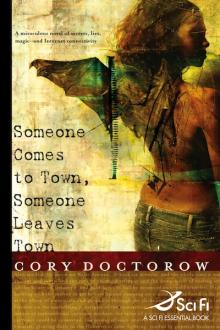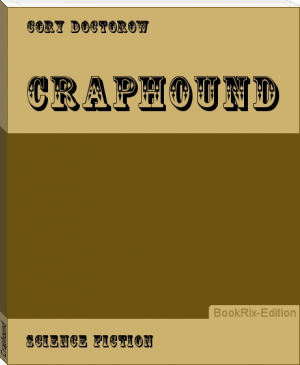Someone Comes to Town, Someone Leaves Town by Cory Doctorow (graded readers TXT) 📕

- Author: Cory Doctorow
- Performer: 0765312786
Book online «Someone Comes to Town, Someone Leaves Town by Cory Doctorow (graded readers TXT) 📕». Author Cory Doctorow
Once the bookcases were seated and screwed into the walls, out came the books, thousands of them, tens of thousands of them.
Little kids' books with loose signatures, ancient first-edition hardcovers, outsized novelty art books, mass-market paperbacks, reference books as thick as cinderblocks. They were mostly used when he'd gotten them, and that was what he loved most about them: They smelled like other people and their pages contained hints of their lives: marginalia and pawn tickets, bus transfers gone yellow with age and smears of long-ago meals. When he read them, he was in three places: his living room, the authors' heads, and the world of their previous owners.
They came off his shelves at home, from the ten-by-ten storage down on the lakeshore, they came from friends and enemies who'd borrowed his books years before and who'd "forgotten" to return them, but Alan never forgot, he kept every book in a great and deep relational database that had begun as a humble flatfile but which had been imported into successive generations of industrial-grade database software.
This, in turn, was but a pocket in the Ur-database, The Inventory in which Alan had input the value, the cost, the salient features, the unique identifiers, and the photographic record of every single thing he owned, from the socks in his sock drawer to the pots in his cupboard. Maintaining The Inventory was serious business, no less important now than it had been when he had begun it in the course of securing insurance for the bookshop.
Alan was an insurance man's worst nightmare, a customer from hell who'd messenger over five bankers' boxes of detailed, cross-referenced Inventory at the slightest provocation.
The books filled the shelves, row on row, behind the dust-proof, light-proof glass doors. The books began in the foyer and wrapped around the living room, covered the wall behind the dining room in the kitchen, filled the den and the master bedroom and the master bath, climbed the short walls to the dormer ceilings on the third floor. They were organized by idiosyncratic subject categories, and alphabetical by author within those categories.
Alan's father was a mountain, and his mother was a washing machine -- he kept a roof over their heads and she kept their clothes clean. His brothers were: a dead man, a trio of nesting dolls, a fortune teller, and an island. He only had two or three family portraits, but he treasured them, even if outsiders who saw them often mistook them for landscapes. There was one where his family stood on his father's slopes, Mom out in the open for a rare exception, a long tail of extension cords snaking away from her to the cave and the diesel generator's three-prong outlet. He hung it over the mantel, using two hooks and a level to make sure that it came out perfectly even.
Tony helped Alan install the shallow collectibles cases along the house's two-story stairwell, holding the level while Alan worked the cordless powerdriver. Alan's glazier had built the cases to Alan's specs, and they stretched from the treads to the ceiling. Alan filled them with Made-in-Occupied-Japan tin toys, felt tourist pennants from central Florida gator farms, a stone from Marie Laveau's tomb in the St. Louis I Cemetery in New Orleans, tarnished brass Zippos, small framed comic-book bodybuilding ads, carved Polynesian coconut monkeys, melamine transistor radios, Bakelite snow globes, all the tchotchkes he'd accumulated over a lifetime of picking and hunting and digging.
They were gloriously scuffed and non-mint: he'd always sold off the sterile mint-in-package goods as quickly as he could, squirreling away the items that were marked with "Property of Freddy Terazzo" in shaky ballpoint, the ones with tooth marks and frayed boxes taped shut with brands of stickytape not offered for sale in fifty years.
The last thing to go in was the cellar. They knocked out any wall that wasn't load-bearing, smeared concrete on every surface, and worked in a loose mosaic of beach glass and beach china, smooth and white with spidery blue illustrations pale as a dream. Three coats of urethane made the surfaces gleam.
Then it was just a matter of stringing out the cables for the clip-on halogens whose beams he took care to scatter off the ceilings to keep the glare to a minimum. He moved in his horsehair sofa and armchairs, his big old bed, his pots and pans and sideboard with its novelty decanters, and his entertainment totem.
A man from Bell Canada came out and terminated the data line in his basement, in a room that he'd outfitted with an uninterruptible power supply, a false floor, dry fire extinguishers and a pipe-break sensor. He installed and configured the router, set up his modest rack and home servers, fished three four-pair wires through to the living room, the den, and the attic, where he attached them to unobtrusive wireless access points and thence to weatherproofed omnidirectional antennae made from copper tubing and PVC that he'd affixed to the building's exterior on short masts, aimed out over Kensington Market, blanketing a whole block with free Internet access.
He had an idea that the story he was going to write would require some perambulatory cogitation, and he wanted to be able to take his laptop anywhere in the market and sit down and write and hop online and check out little factoids with a search engine so he wouldn't get hung up on stupid details.
The house on Wales Avenue was done. He'd repainted the exterior a lovely robin's-egg blue, fixed the front step, and planted a low-maintenance combination of outsized rocks from the Canadian Shield and wild grasses on the front lawn. On July first, Alan celebrated Canada Day by crawling out of the attic window onto the roof and watching the fireworks and listening to the collective sighs of the people densely packed around him in the Market, then he went back into the house and walked from room to room, looking for something out of place, some spot still rough and unsanded, and found none. The books and the collections lined the walls, the fans whirred softly in the ceilings, the filters beneath the open windows hummed as they sucked the pollen and particulate out of the rooms -- Alan's retail experience had convinced him long ago of the selling power of fresh air and street sounds, so he refused to keep the windows closed, despite the fantastic volume of city dust that blew in.
The house was perfect. The ergonomic marvel of a chair that UPS had dropped off the previous day was tucked under the wooden sideboard he'd set up as a desk in the second-floor den. His brand-new computer sat centered on the desk, a top-of-the-line laptop with a wireless card and a screen big enough to qualify as a home theater in some circles.
Tomorrow, he'd start the story.
Alan rang the next-door house's doorbell at eight a.m. He had a bag of coffees from the Greek diner. Five coffees, one for each bicycle locked to the wooden railing on the sagging porch plus one for him.
He waited five minutes, then rang the bell again, holding it down, listening for the sound of footsteps over the muffled jangling of the buzzer. It took two minutes more, he estimated, but he didn't mind. It was a beautiful summer day, soft and moist and green, and he could already smell the fish market over the mellow brown vapors of the strong coffee.
A young woman in long johns and a baggy tartan T-shirt opened the door. She was excitingly plump, round and a little jiggly, the kind of woman Alan had always gone for. Of course, she was all of twenty-two, and so was certainly not an appropriate romantic interest for him, but she was fun to look at as she ungummed her eyes and worked the sleep out of her voice.
"Yes?" she said through the locked screen door. Her voice brooked no nonsense, which Alan also liked. He'd hire her in a second, if he were still running a shop. He liked to hire sharp kids like her, get to know them, try to winkle out their motives and emotions through observation.
"Good morning!" Alan said. "I'm Alan, and I just moved in next door. I've brought coffee!" He hefted his sack in her direction.
"Good morning, Alan," she said. "Thanks and all, but --"
"Oh, no need to thank me! Just being neighborly. I brought five -- one for each of you and one for me."
"Well, that's awfully nice of you --"
"Nothing at all. Nice morning, huh? I saw a robin just there, on that tree in the park, not an hour ago. Fantastic."
"Great." She unlatched the screen door and opened it, reaching for the sack.
Alan stepped into the foyer and handed it to her. "There's cream and sugar in there," he said. "Lots -- don't know how you folks take it, so I just figured better sure than miserable, better to err on the side of caution. Wow, look at this, your place has a completely different layout from mine. I think they were built at the same time, I mean, they look a lot alike. I don't really know much about architecture, but they really do seem the same, don't they, from the outside? But look at this! In my place, I've got a long corridor before you get to the living room, but your place is all open. I wonder if it was built that way, or if someone did that later. Do you know?"
"No," she said, hefting the sack.
"Well, I'll just have a seat while you get your roommates up, all right? Then we can all have a nice cup of coffee and a chat and get to know each other."
She dithered for a moment, then stepped back toward the kitchen and the stairwell. Alan nodded and took a little tour of the living room. There was a very nice media totem, endless shelves of DVDs and videos, including a good selection of Chinese kung-fu VCDs and black and white comedies. There was a stack of guitar magazines on the battered coffee table, and a cozy sofa with an afghan folded neatly on one arm. Good kids, he could tell that just by looking at their possessions.
Not very security-conscious, though. She should have either kicked him out or dragged him around the house while she got her roomies out of bed. He thought about slipping some VCDs into his pocket and returning them later, just to make the point, but decided it would be getting off on the wrong foot.
She returned a moment later, wearing a fuzzy yellow robe whose belt and seams were gray with grime and wear. "They're coming down," she said.
"Terrific!" Alan said, and planted himself on the sofa. "How about that coffee, hey?"
She shook her head, smiled a little, and retrieved a coffee for him. "Cream? Sugar?"
"Nope," Alan said. "The Greek makes it just the way I like it. Black and strong and aromatic. Try some before you add anything -- it's really fantastic. One of the best things about the neighborhood, if you ask me."
Another young woman, rail-thin with a shaved head, baggy jeans, and a tight t-shirt that he could count her ribs through, shuffled into the living room. Alan got to his feet and extended his hand. "Hi there! I'm Adam, your new neighbor! I brought coffees!"
She shook his hand, her long fingernails sharp on his palm. "Natalie," she said.
The other young woman passed a coffee to her. "He brought coffees," she said. "Try it before you add anything to it." She turned to Alan. "I thought you said your name was





Comments (0)